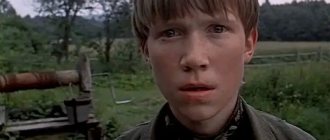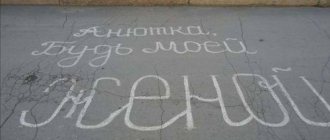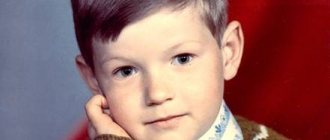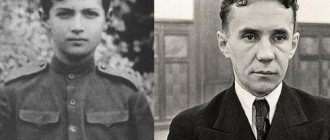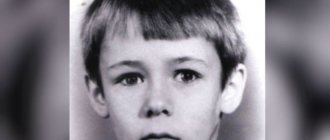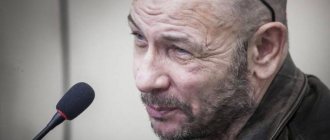Date and cause of death
Acute heart failure caused the death of Alexei Balabanov. The tragedy occurred in the Dunes sanatorium, located in Sestroretsk (an intra-city municipality within the Kurortny district of St. Petersburg). The director arrived there in the hope of restoring his damaged health.
According to information received from Balabanov’s relatives, he has recently complained of pain in his kidneys and liver. However, he did not go to the hospital, continuing to work on the next script. At the insistence of friends and family, Alexey nevertheless agreed to undergo a course of rehabilitation treatment in Sestroretsk.
According to employees of the institution, on May 18, 2013 at 12 o’clock he went to lunch, after which he continued working on the script. Around 4 p.m. he lost consciousness and fainted. The doctor who arrived was unable to help; the creator of “Brother” died at the age of 54.
“According to the medical report, the cause of death is acute heart failure. He had been feeling unwell recently, but died precisely because of a heart attack. No heart can withstand such powerful loads, he worked very hard,” Interfax reports, citing a source from Lenfilm.
Where is he buried?
According to the will of the deceased, a civil funeral service was not held. Russian Tarantino (as his fans called him), who did not like honors during his life, asked to be sent on his last journey without any special events. The previously scheduled official farewell ceremony at Lenfilm was cancelled.
The funeral service took place on May 21 in the Prince Vladimir Cathedral on the street. Blokhin, after which the coffin with the body was taken to the Smolensk cemetery, where the burial took place.
The grave of Alexei Balabanov is not much different from those nearby. A slightly rickety wooden cross, a small stone monument with a photograph, initials and date of death.
3 years after the funeral, several KP correspondents, in a conversation with their son Fyodor, asked the question: “Why is there still a temporary cross on my father’s grave?” In response, they received the following saying: “A cool grave?.. I don’t know if this is happiness, if this is the point. The burial is what it is... It seems to me that dad erected a worthy monument to himself during his lifetime - these are his films.”
Another colleague from Lenfilm agreed with his son’s statement, emphasizing, “You shouldn’t judge strictly... I’m sure that it was Lesha’s will. He did not want to be made of him as a “memorial man.” And he even said that he wanted a modest grave. It’s simply respecting the will of the deceased.”
“Inconvenient” director: thriller “Cargo 200”
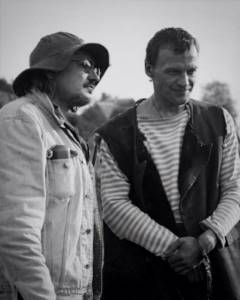
Alexey Balabanov (left) and Alexey Serebryakov on the set of Alexey Balabanov’s feature film “Cargo-200”. Photo: kinopoisk.ru

Alexey Poluyan as police captain Zhurov in Alexey Balabanov’s feature film “Cargo-200” (2007)
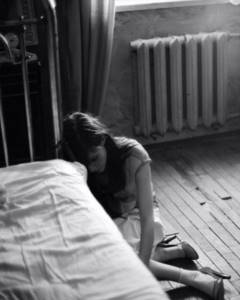
Agniya Kuznetsova as Angelica in Alexey Balabanov’s feature film “Cargo-200” (2007)
On September 20, 2002, a close friend of Alexei Balabanov, Sergei Bodrov, died in the Karmadon Gorge. The director took the loss hard. In an interview for the film “Balabanov” by Lyubov Arkus Selyanov said: “Balabanov before and after Karmadon are different people. That is, of course, this is the same person... Alyosha wanted to be there. This is what haunted him, that he did not end up with Seryozha, Marina, Volodya, with other people close to us, close to him. And this feeling did not let him go.” To help his friend get out of the crisis, he suggested that Balabanov make two films based on other people’s scripts. First, the black comedy “Dead Man’s Bluff” was released, then the melodrama “It Doesn’t Hurt Me.” In 2004, the director was working on the film “The American,” but it remained unfinished: the guest actor was unable to continue filming.
In 2007, Alexey Balabanov began working on the film “Cargo-200”. The film was ready quickly: it took a month to write the script and a month and a half to shoot. It was based on real events: the director told the story of a girl who was kidnapped by a policeman. There is a lot of cruelty and violence in the film. After reading the script, actors Sergei Makovetsky and Yevgeny Mironov refused the main role. As a result, Alexey Poluyan was approved. Angelica was played by Agniya Kuznetsova, a student at the Shchukin School.
This is a very controversial picture from a moral point of view... Yes, this all actually happened. And I gleaned many details from personal experience. 1984 was a heyday for me personally. I was young, just came from the army. But it was then that I and my generation as a whole felt that everything would soon collapse. This is the moment I wanted to convey on the screen - the moment of the collapse of the country, the spiritual collapse of specific people, such as the main character, this policeman. It turned out tough, but so was the timing.
Alexey Balabanov
The film received mixed reactions. When the film was released, the cashiers refused to sell tickets for the show and discouraged visitors. At the Kinotavr festival, the main prize was awarded to Balabanov. However, then the management of the award decided to share first place between “Cargo 200” and Alexei Popogrebsky’s film “Simple Things”. In protest, some critics refused to judge at the festival and wrote an Open Letter to the Board of the Guild of Film Critics: “The task of critics is to encourage - and in some cases protect - “inconvenient” artists who do not work with the expectation of festival prizes and wider OK".
short biography
Alexey Oktyabrovich Balabanov was born on February 25, 1959 in Sverdlovsk (Ekaterinburg). The Soviet-Russian film director, screenwriter, and producer was awarded the Nika Prize for the film “About Freaks and People.” He is the author of works that have become cult: “Brother”, “Brother 2”, “War”, “Dead Man’s Bluff”. Known as the most truthful, mysterious and controversial director of Russian cinema.
Childhood and youth, studies
Alexey was born into a student family. My father was finishing law school, my mother was in her last year of medical school. Almost no time was devoted to raising the boy, which affected his character.
He himself said the following about this: “I grew up as a hooligan, I shot a lot with a slingshot. He made “bombs” and placed them in trash cans, there used to be iron ones, and waited for passers-by. Played cards." At the insistence of my mother, from the second grade I began to study in-depth English.
Having received a school diploma, on the recommendation of his parents he becomes a student at the translation department of the Gorky Pedagogical Institute of Foreign Languages. In 1980 he went on a six-month internship in England.

In 1981, having completed his studies, he was drafted into the army. Given the opportunity to choose: service in Ethiopia or in aviation with flights to the Middle East, he gives preference to the second. During his service, he visited Angola, Ethiopia, Equatorial Guinea, and Syria.
Later, in a conversation with a reporter from Medved magazine, Alexey Balabanov said that he became acquainted with the war during this period. In the car, experienced soldiers sat him behind the driver: “To cover themselves.” At first such an act was perceived as cynical, later – rational.
On topic : Biography and cause of death of General Lebed.
A few months before demobilization, Balabanov was fired from aviation for repeated violations:
- Missing a flight in Hungary.
- Buying music records.
- Distribution of jokes about Brezhnev.
The guy ends up in the Navy, at a Riga shipyard specializing in the repair of submarines. From that moment on, Balabanov’s favorite clothing became a naval vest.
Returning from the army in 1983, on the recommendation of his father, he entered the Moscow VGIK. But after the first exam, on his own initiative, he takes the documents and returns to his hometown. Here he finds work at the Sverdlovsk film studio.
The position of third assistant director (the lowest) implied frequent travel throughout the territory of the Union. He spends his free time at a local rock club, where he meets Vyacheslav Butusov and Dmitry Umetsky (founders of the group Nautilus Pompilius).
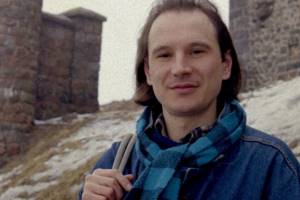
In 1987 he entered the capital's Higher Courses for Scriptwriters and Directors. After 3 years he receives a diploma and moves to Leningrad. Here he gets a job at Lenfilm, where his career growth begins.
Popularity
In 1992, together with Sergei Selyanov, Vasily Grigoriev and Lenfilm, he founded the cinema, where most of his films were subsequently released. All-Russian popularity came in 1997, when, with a limited budget and in just 31 days, Balabanov shot the action film about bandits “Brother,” which became a cult classic. In the film, Alexey acts as a screenwriter and director. The film received 7 international awards.
A year later, in 1998, he filmed “About Freaks and People,” the plot of which was conceived back in 1993. The provocative film became the reason that the director could not find investors for filming.
As a result, having filmed the budget “Brother” and traveled to international film festivals, he acquired a positive reputation, which was reflected in the attitude of sponsors. The film also won numerous awards and prizes. In 2000, the expected second part of “Brother” was released.

In 2002, “War” was filmed, which received mixed reviews due to the politically incorrect perception of what was happening in the Caucasus during the Second Chechen War.
For some time, Balabanov retreats from the intended trajectory and shoots less complex films, in which a touch of humor can be traced.
In 2007, a Russian drama about the harsh morals of a provincial town in the twilight era of the Soviet Union was released. The film is met with ambiguity:
- At Kinotavr he was awarded the prize of the Guild of Russian Film Critics, but the presentation of the award was crowned with a scandal.
- In some regions it is withdrawn from screening due to the abundance of violent scenes.
Each work of Balabanov is an original creation with an embedded piece of soul. None of them went unnoticed by viewers and film critics. There could be even more of them if Alexey paid attention to his health.
Friends, acquaintances
According to Balabanov’s recollections, during his school years he was friends with Evgeniy Grenburg (doctor, musician, entrepreneur, president of the Dynamo-Field Hockey Sports Club, organizer and director of the annual festival “Old New Rock”). In middle school, the boys organized the rock band “Keri”, where Alexey acted as a guitarist.
Later, after the army, he met the musician guys from Nautilus. New friends starred in his works several times. They introduce the aspiring film director to other members of the Sverdlovsk Rock Club:
- "Semantic hallucinations".
- "Agatha Christie".
- "Nastya".
On topic : The cause of death of the brilliant director Galina Volchok.
Of the people associated with cinema, he maintained friendly relations with the following:
- S. Selyanov.
- A. Konchalovsky.
- N. Mikhalkov.
- S. Bodrov.
- V. Sukhorukov.
- S. Pismechenko.
- S. Makovetsky.
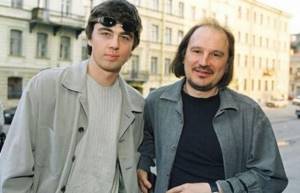
Personal life
Married 2 times. From every marriage there are children:
- In the first, Irina gave birth to Fyodor.
- The second wife, Nadezhda Vasilyeva, gave birth to Peter.
Both children bear their father's surname.
What do close relatives do?
There is little information about the lesser-known members of Alexei Balabanov’s family:
- The eldest son Fedor received an economic education. In a conversation with a KP reporter in 2021, he stated that he was going to follow in his father’s footsteps and seriously engage in production activities.
- The youngest son Peter starred in his father’s film “I Want Too.” What he is doing today is unknown.
- Nadezhda Vasilyeva continues to work as a costume designer at Lenfilm. In 2021, she repeatedly appeared on screen during the presentation of models from the acclaimed film “Matilda”.

Filmography
From the abundance of works by Alexei Balabanov, several paintings can be distinguished that have become iconic:
- “Brother” – 1997
- “About Freaks and People” – 1998
- “Brother 2” – 2000
- “War” – 2002
- “Zhmurki” – 2005
- “It doesn’t hurt me” – 2006
- “Cargo 200” – 2007
- “Stoker” – 2010
- “I want it too” – 2012
In the near future, the producer considered creating films about Stalin’s young years and the project “My Brother Died.” The script remained unfinished and he did not have time to complete it.
"Brother" - a cult movie of the 1990s
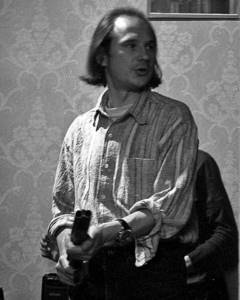
Alexey Balabanov on the set of his feature film "Brother". Photo: session.ru

Sergei Bodrov and Alexey Balabanov (right). Photo: hmtk.ru
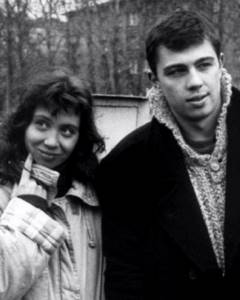
Svetlana Pismichenko as Sveta and Sergei Bodrov as Danila Bagrov on the set of the feature film “Brother” by Alexei Balabanov. Photo: kino.ru
In 1996, at the Russian film festival “Kinotavr”, Alexey Balabanov met Sergei Bodrov Jr. The actor starred in the film “Prisoner of the Caucasus” and received a prize for “Best Actor”. Balabanov recalled: “I really liked him then. I suggested to Seryozha: “Let’s make a movie together. But I don’t have any money.” He says: “Come on.” I told him the idea of "Brother". Bodrov agreed. They quickly found a common language and became close friends. The film's budget was 100 thousand dollars - small by the standards of the film industry. They saved on everything: filming took place in the apartments and dachas of the director’s friends, and they played in their own clothes. Actors Sergei Bodrov, Viktor Sukhorukov, Svetlana Pismichenko starred in the film for free.
Foreigners filmed Anna Karenina. They left, and one acquaintance said to me: “Seryoga, do you need some film?” The Americans left them - the boxes were opened, but wrapped up. The film turned out to be good, fresh - Kodak, there were no problems with it. Those who had a car drove by car. We rented apartments from acquaintances. I had my own lighting equipment. The make-up girls cooked sausages and potatoes for lunch.
Sergey Astakhov, cameraman (Maria Kuvshinova “Balabanov”)
The film was completed in 31 days, and already in 1997 it was released on the big screen. The crime drama about Danil Bagrov, who moved from the provinces to St. Petersburg and became a killer, immediately became a cult classic. The character of Sergei Bodrov was called “the hero of the new generation.” Balabanov said about the film: “This is a life experience, that’s all. These are people's stories. I had a couple of such acquaintances who returned from the war and became bandits. But then there were countless of them in the country.” The director paid much attention to music: the film featured the bands Nautilus Pompilius, Chizh, Aquarium, Kolibri and the guitarist DDT.
The eight heroes of “Brother” speak from the screen in voices other than their own: Alexey Balabanov re-voiced the actors. The role of Viktor Sukhorukov, who played Danila Bagrov’s older brother, was dubbed by Alexey Poluyan. In an interview with Yuri Dudu, Nadezhda Vasilyeva said: “He believed that sound was filming a film for the second time. The main thing for him [Balabanov] was to combine incompatible things: there was only one role, it was played by an artist. And then another artist played the same role. And he took it and glued it together. This is interesting. Additional energy appears."
To be honest, I think about this film, my hero, all the time, and this picture appears before my eyes. Primitive people are sitting around the fire. Cave. There is primeval chaos all around. Animals walk around, all kinds of lizards. And suddenly one person stands up and says: “Now it will be like this - you need to protect your brother, you need to protect a woman, you need to protect the weak!” And these are the only words that are heard in this chaotic primitive world.
Sergei Bodrov, actor
In 1997, the film “Brother” was shown in the Cannes “Un Certain Regard” program. The film received the Kinotavr Grand Prix, a Gold Medal at the festival in Trieste, Italy, and the Nika Award for best film.
TV shows, films, books about the hero
Alexey Balabanov has repeatedly said that he has been keeping diaries since 1981. They are located with Nadezhda Vasilyeva. According to the woman’s stories, she re-reads emotional narratives about certain periods of her late husband’s life several times.
The maximum effect is produced by the description of a teenager being at war. The director's widow considered using them for the script of a separate film, but was dissuaded by family friend Sergei Selyanov.
Before the five-year anniversary of his death, a documentary film by blogger Yuri Dud, entitled “Balabanov - a brilliant Russian director,” was released on YouTube.
He is called one of the most outstanding directors of Russian cinema. This is how Sergei Grachev, the author of the weekly “AiF”, who knew him personally, responds: “Silent, gloomy. Invariably in a shabby vest. He made films of various genres. I was different in life too.”
Balabanov’s favorite film: “About Freaks and People”
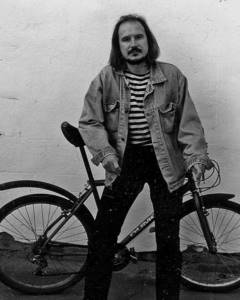
Alexey Balabanov. Photo: session.ru

Still from Alexey Balabanov’s feature film “About Freaks and People”, 1998

Sergei Makovetsky as Johann in the feature film by Alexei Balabanov “About Freaks and People” (1998)
"Brother" was a commercial success. Having earned money, Alexey Balabanov returned to the script for the film “About Freaks and People.” I filmed in my communal apartment in St. Petersburg: high ceilings and a Dutch oven helped recreate the atmosphere of the early 20th century. According to the plot, Mr. Johann is obsessed with pornographic photos and wants to make money from their production. He calls the intellectual Putilov as a business partner. The main roles were played by Sergei Makovetsky and Viktor Sukhorukov - actors who had already worked with the director in his other films. In an interview with Yuri Dudu, Sergei Selyanov recalled: “It’s not that Lesha didn’t talk to the actors. He didn't rehearse. He saw a person and understood whether he was suitable for him or not. His main remark was “overheated.” So he outplayed. He told the artists: “Don’t play.” Don’t play and that’s it.” Despite the advent of digital shooting technology, Balabanov shot on film.
The film is made from cows - from gelatin. This is a living substance. It stores the energy you give. But the number does not convey energy. Kodak raises special cows, a special variety, from which they then make film. So I shoot with it.
Alexey Balabanov (interview with Medved magazine)
Alexey Balabanov considered the film “About Freaks and People” the best in his directorial career. The premiere took place in 1998 at the Cannes Film Festival. The film was highly praised by critics: for the second year in a row, Balabanov’s film became the best at the Nika Award.

